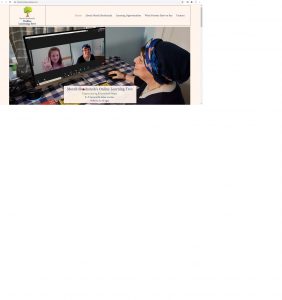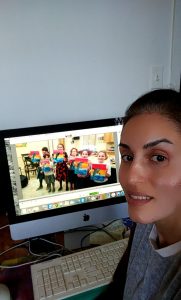Business is Zooming!
Ita Yankovich

Paula Shoyer conducting a cooing Zoom session.
A year ago, “zoom” to most people was just a synonym for “fast.” But today, you’d be hard pressed to find a household that doesn’t use the word as part of their daily vernacular. Zoom Video Communications Inc. was founded in 2011 by Eric S. Yuan, a Chinese-born engineer who is the company’s C.E.O. Thanks to COVID-19, it has become the most popular remote video conferencing service in the United States. With major companies like Apple, Amazon, Twitter, and Google as well as dozens of other smaller companies are encouraging remote work, it seems that Zoom is here to stay. And it’s not just corporations. Your child’s rebbe, fitness instructor, and therapist, are all Zooming these days.
With the media focused on the negative outcomes of the pandemic, we wanted to focus on a positive angle to our current life situation. Sure, there are reports of stocks plunging, stores closing, and bankruptcy soaring, but not all is doom and gloom in the financial world. Some individuals and industries have managed to stay afloat – and even profit – by shifting their business from office to online.
Why is Zoom so Popular?
Zoom is a favorite among all demographics and pretty much all industries from medicine and law to people who just want to connect with friends and family.
“Everyone, from my grandma to my rebbe, can tell immediately how well it’s operating,” explains Jake Saper, a partner at the venture-capital firm Emergence, Zoom’s first Silicon Valley-based institutional investor.
Jake told the New Yorker that Zoom‘s underlying code makes the user feel like there’s no distance between him and the person he’s talking to. The design is also appealingly basic. The “gallery view” mode, which arranges participants in “Hollywood Squares”-style tiles, has the somewhat dated appeal of graph paper, suggesting a stodgy reliability. The “active speaker view” mode — in which a single enlarged window is given to whomever is currently speaking — is only a touch more exciting. There is a mute function — an option that many will likely come to miss once face-to-face meetings resume — and participants can choose a virtual background to block their environment from view. They can also share their screen with other users, and a chat box is available for real-time written communication — which, not unlike passing notes in class, feels a little illicit, he says.
Daniel Foley is the director of Assertive Media, a digital marketing agency based in the United Kingdom that specializes in virtual and ROI-based advertising. In his experience, Zoom can boost company profits. He maintains that with its “anywhere, anytime” feature you can make your business worldwide.
“You are not limited to the general 9 to 5 hours,” Foley says.
Quick fire meetings (that can be recorded for future references) can be done with a quick video call, hashing out ideas more quickly than the traditional face to face meetings saving you time, effort, and resources.
Tech Tutors
One of the effects of schools reverting to virtual or hybrid learning is that some kids are falling behind academically. Some kids cannot learn their full curriculum on Zoom, others do not have the attention span to sit still for hours, and still others may have a learning disability, or just need extra help. Online tutoring is one of the industries that has been booming since parents found themselves ill-equipped or unable to teach their kids proper kriah or the Pythagorean Theorem. Tutoring has stepped in to fill that academic void.
Susie Meyersdorf is a native Brooklynite who is known affectionately as Morah Shoshanah by the clients who enroll in her Morah Shoshanah’s Online Learning Tree program. She offers K-4 tutoring in English, and math as well as in Chumash, Navi and Hebrew language for all ages. A devoted, full time teacher for 30 years, she was unable to do as much tutoring as she would have liked.
“While I love the milieu of a classroom, the one-to-one setting of tutoring allows for extreme clarity in the learning process,” she says. Her at home business was borne out of the pandemic. “There is a tremendous need for remote tutoring. As I acquired experience in remote tutoring this past year, I discovered that it is a wonderful way to educate and to be educated.”
Meyersdorf’s online business started shortly after Rosh Hashanah with close to 10 students and several more planning to join after Sukkos. She’s received inquiries about teaching small groups as well.
Meyersdorf utilizes Zoom to create learning relationships with her beloved students. She offers perks such as educational videos which she creates and sends to her students and their families. Another advantage to Zooming is that Meyersdorf often gets to meet family members of her clients, including their pets. She was thrilled to see two dogs “sitting in” on one of her classes, but a group of pet frogs was a bit more…restless. “If only I had been teaching about the makkos,,” she jokes.
Morah Shoshanah customizes her lessons through a plethora of online programs and materials. She credits the virtual platform for her ability to teach remotely from anywhere in the world.
“Like all of us, I sincerely pray for an end to this horrid pandemic, “ she says, “But I also cannot imagine what would have been if it had occurred when we didn’t have this technology.”
Junior high school teacher Robert Levine saw firsthand the learning difficulties many students faced last spring, prompting him to partner with Scott Appelman in creating Fore Front Tutors, LLC, a virtual tutoring company made up of fellow certified NYC teachers. Their online tutoring company provides virtual tutoring for grades K-12 in the four core school subjects: math, ELA, science, and social studies. Additionally, they provide tutoring for several standardized tests, such as the SAT, ACT, SHSAT, TACHS, CHSEE, Regents, and AP exams.
Levine explains that there are many benefits to Zoom tutoring. Parents do not have to worry about pickup or drop off. It is easier for teachers to implement online resources, and the “share screen” feature and virtual whiteboard make it exceptionally easy to bridge the gaps in student knowledge. All work completed on a Zoom session can be saved to a computer and kept forever to be used as a resource for future work.
Another benefit is that tutors are not limited by proximity. “Since we are virtual, we can work with students in any location. Our tutors are located in NYC, but we can assist struggling students anywhere in the country,” says Levine.
Fore Front Tutors has been in business for a month and a half and already has eight tutors on staff and a client base that is growing each week. The business has become so successful that they have expanded to educating teachers on how to use virtual teaching platforms more efficiently and safely with their students.
“A lot of teachers were thrown into this without any training. We see it as a responsibility to get more teachers comfortable with virtual learning, because like it or not, it is here to stay,” explains Levine.
Levine projects that within a year, the new company will be a well-known brand explaining, “We understand that the market is now ripe for tutoring businesses, but our name is Fore Front Tutors for a reason,” he says. “We are getting out on the ‘forefront’ of this new wave of education.” And while many blame COVID-19 for ruining their business, Levine says without the pandemic, Fore Front Tutors would have never existed.


Screenshots of a typical Fore Front Tutors virtual session.
Take a Zoom and Call Me in the Morning
Eliezer Shlomovich is a psychotherapist who practices out of his humble Marine Park apartment. He also has to deal with three teenage boys who at times are also learning at home, a wife who has transformed their bedroom into a makeshift office, and a temperamental cat named Menorah. For decades he has conducted sessions out of an office but thanks to COVID-19, his workspace is now his home space. The pandemic has affected practically everyone in a negative way, prompting more individuals to seek therapy, and with more flexibility, now that many are working from home. Shlomovich’s pool of clients has ballooned to an all-time high of 45 with many drowning in issues related to anxiety, depression, and PTSD. Zooming with clients has been mostly seamless, and he reports that there hasn’t been a noticeable challenge in diagnosing and treating. Aside from evaluating body language, he hasn’t encountered a significant sense of disconnect with clients. He adds that Zoom sessions have made his clients feel more comfortable, which facilitates the work and rapport.
Cynthia Malek is another Marine Park resident who works as a staff psychotherapist and licensed marriage and family therapist for Neighborhood Counseling Center. She currently provides telehealth psychotherapy to 26 patients. Although she says her caseload is roughly the same, she does admit that session frequency has increased for some since the start of the pandemic. Like Shlomovich, she is satisfied with the level of treatment and reports that virtual therapy is going “just as well as when providing services in person.” And while some may question the quality of Zoom therapy, Malek is quick to point out that there are advantages to it in the sense that it has made psychology more accessible to those with significant health, mobility, and transportation issues. For those who are skeptical about conducting therapy over the computer, Malek points out that telephonic therapy might feel emotionally safer for clients with significant issues related to shame.
“My clients are grateful, as am I, for the continued opportunity to engage in psychotherapy and to continue to strive toward their mental health goals amidst this pandemic,” she says.

Naomi Nachman taping a cooking session.
Cooking in Quarantine
Personal chef Naomi Nachman has taken her passion for cooking and transformed it into a full-blown career. She is currently an author, global ambassador to Kosher.com, and a media personality who appears on several media outlets. She was busy on a book tour promoting her latest bestseller, Perfect Flavors, when the pandemic hit. Luckily, her daughter is a graphic artist and she was able to quickly design a Zoom flier for her mother, allowing her to bring her kitchen into everyone’s desktop.
Since Pesach, Naomi has hosted over 70 Zoom sessions and the requests keep on coming. She has done four quarantine episodes of her popular show on Kosher.com called Sunny Side Up, headlined fundraisers and shul dinners, arranged family reunion cooking meetings, and was even hired by a couple in Chicago for a date night. To make her Zoom presentations more personable, Naomi keeps the session going for an hour past its allotted time so participants can chat and connect. With business not slowing down anytime soon, Naomi’s future projects include partnering with Empire Chicken to come up with new meat dishes. For the upcoming holidays of Thanksgiving and Chanukah, Naomi is planning on Zooming a new potato latke recipe, which will incorporate seasonal ingredients like turkey and corn.
Referring to herself as a “pioneer in the industry,” Naomi states that to survive during these ever-changing times, entrepreneurs must evolve and adapt. Since the pandemic hit, she has refused to let business simmer down. She has connected with people from 20 states and seven countries online, always networking and promoting her brand. She transformed her basement kitchen into a makeshift Zoom studio equipped with a tripod and an iPod so she can post videos from home. At the beginning of the pandemic when everything was shut down, she wasn’t able to record live in the studio with the crew from kosher.com, so Naomi improvised and had her kids hold up the cameras while the show’s producer was on the phone directing them.
Although her Zoom classes are widely sought after, Naomi admits that she prefers travelling to various Jewish communities and visiting shuls rather meeting people virtually through the world wide web.
“I am a big ‘people person’,” she says. “I love an audience and hate seeing black screens. I would much rather connect with my fans and guests in real life.”
Paula Shoyer, aka “the Kosher Baker,” is the author of The Healthy Jewish Kitchen, The Holiday Kosher Baker, The Kosher Baker, The New Passover Menu, and The Instant Pot Kosher Cookbook, scheduled for release in February. She has done cooking segments on several syndicated television shows throughout the country and does cooking classes and talks all around the world, but now all her events are virtual. She has taught about 75 virtual classes, ranging in attendance from five to 600. She says the entire culinary industry has moved their kitchens onto social media.
Home cooking has seen a resurgence thanks to the pandemic. “People have more time to cook,” Shoyer attests. “It is safe to eat at home, and having more people around means that it is more fun. They to have people to cook with and for. They have also discovered so many new recipes to try online.”
But cooking on Zoom is not all it’s cracked up to be. Shoyer explains that it requires more energy and improvisation than a live show. “In person I can prevent problems in advance, while on Zoom we often have to correct a mistake halfway through the step. I have devised several hacks to moisten dry dough, dry out wet dough, help things cook faster, find substitutions for ingredients mid-recipe, and more,” she says.
Shoyer has had to conduct her business differently now, trying out different models of teaching to find what works best and identify what people really want to learn. “I have also had to figure out which recipes people can learn from a Zoom class and which are too hard to prepare without someone right there guiding you. I have also had to develop more and more new programs to teach to satisfy the demand,” she says.
Shoyer maintains that Zoom classes can be profitable, but the sessions have to be about volume rather than higher priced events. She explains that people have less money to spend and therefore the market will only bear a certain price per class, so she offers many more classes to compensate. She proudly states that she has been able to teach many more people than she would with live events.
Zumba Zoom
Therapy may be exercise for the mind, but during these challenging times, we have an equal need for exercise for the body.
Sarede Rachel Switzer heads Crown Heights Fitness, a popular fitness business, which in the past offered classes in people’s homes, schools, camps, and senior centers. Switzer switched to online classes when the pandemic hit and all her in-person classes were canceled. While many of her clients followed her virtually, others did not, so she started teaching yoga classes via Zoom to supplement her income. Not only did the internet give her a venue for her exercise classes, but it also helped her gain new participants through Facebook, Instagram, and WhatsApp.
Teaching yoga on Zoom is different from a live class. Switzer explains that when she teaches a live class, she needs to demonstrate the technique to the entire group, while Zoom classes have her observing the participants for most of the session. “I find that having to watch everyone on the screen gives me an added level of focus and awareness since all of my adjustments are verbal rather than hands-on,” she says.
With the lack of distance restriction, Switzer is now able to teach people from all over the world; she currently has several students from Israel and one from Sweden who log into her classes. Switzer herself became a Zoom student, attending daily live online yoga, contortion, and handstand classes.

Morah Shoshanah on one of her virtual tutoring classes.
Pandemic Pastimes
With limited public outlets for entertainment these days, it takes creativity to find leisurely activities for the family. The Washington Post ran a poll asking people how they are filling their quarantine time. 250 people responded that they are learning to play a musical instrument, or engaging in art, creative projects, or other hobbies. Based on the survey results, art appreciation, is seeing a resurgence. It is one of the few activities you can do alone or in a group and still have fun even if you are doing it in your pajamas in your living room.
Rufina Gilkarov has been teaching adults and kids in the area for the past 35 years. Her passion for drawing, painting, art history, printmaking, illustration, comic cartooning, animation, and VR Tilt Brush are incorporated in her classes to inspire students and help them express their creativity. Gilkarov recognized that many of her students were having a hard time coping with the pandemic, and she knew that art would help – so on March 23 she began offering her art classes on Zoom.
“I found online classes particularly challenging,” she admits. “However, I too, needed to face the reality that we are in critical times, so I felt that I had to offer my services online.”
Students enrolled in her online class are able to master drawing and painting techniques using pencils, brushes, charcoal, and palette knives, to shade or draw. “I decided to change my methodology by painting on glass, masks, and fabric with acrylic nontoxic paint. Since I knew I wasn’t going to be giving lessons in-person, I had to come up with fun ideas,” she says.
Gilkarov has been successful with students ranging in age from 6 to 96. Since starting her classes online, she has negotiated her fees with sensitivity to the critical times we are facing.
In the beginning, Gilkarov was worried about how her instructions would carry over online, but she says she is pleased with the outcome and impressed her students’ ability to implement technique and create masterpieces. Despite her Zoom success, she says she hopes to reunite with her students face-to-face.

Rufina’s virtual art students proudly displaying their work.
“Yes, online classes present a huge challenge, even though they are rewarding,” Gilkarov says. “I feel like I have a different relationship with my previous students compared to my new students.”
While some individuals chose to this time to unleash their creative side, others used the time to work acquire new skills to make them more valuable in the workforce. This is where Marine Park’s own Eliezer Blatt comes into the picture. Blatt, who currently resides in Israel, is a speaker-trainer and presentation skills expert. He also is a professional drummer, singer, and hypnotherapist. Using his talent from his child acting days as well as the knowledge he acquired with his honors degree in television production and professional speech, and his years of work on award-winning television production teams (Cosby, MTV, and PBS’s Reading Rainbow), Blatt coaches speakers, authors, teachers, and professionals all over the world. Some of the leading organizations he worked with include Aish Hatorah, Yeshiva University, and NCSY, and his students include Charlie Harary, Rabbi Yoel Gold, and Rabbi Yom Tov Glaser.
Before COVID-19 he used to conduct group and individual coaching and training seminars throughout the world, but today Blatt has maintained his income by going virtual. He hosts one-on- to-one and small group training in addition to public webinars.
“With the pandemic, this is the only way that I can service my clients,” Blatt says. “And even without the pandemic, it’s a way for me to work with clients all over the world, without having to travel.”
Zoom sessions lack the intimate, personal feeling that he has when he’s face to face with the client. Although he saves time and energy travelling to see clients, Blatt admits that he does have to work harder to create the same level of energy and personal connections in his sessions.
Zoom’s growth-now up to 200 million daily users- continues to skyrocket, there remains no replacement for person-to-person contact. That said, it is both encouraging and inspiring to know that there are entrepreneurs out there who have managed to find success as they navigate their way through a world that has changed so rapidly.
Zooming to Success
Brick-and-mortar businesses are so yesterday. If 2020 has taught us anything, it is that in order to survive in an ever evolving economy and social climate we must be prepared to improvise and adapt to the needs of the financial world.
Here are some steps on how you can Zoom your way to financial security.
Social connections on social media. Especially if you are a small business, it is beneficial for you to engage with other local stores and form community connections. This will expand your exposure and increase your clientele. If you are hair stylist, for example, you may want to collaborate with a popular clothing store in the neighborhood and offer customers a free Zoom hair styling session if they spend more than $100 at the store. Joining forces will boost everyone’s sales.
Go live with virtual business. You can still make a sale by staying safe at home. If customers cannot come to you, then you must go to them. Offer customers a virtual experience of shopping in your store via Zoom, Facebook, Instagram, YouTube, or Google Hangouts. Link your catalog directly to your social media accounts, making it super easy for customers to buy. Websites are no longer sufficient; you must have an online presence and update it often. Make sure to upload all your inventory online. Do a popup sale, post an interview, or host an online event featuring your new products or services.
Discounts, promotions, and sales. Social media is all the rage right now and you need it to survive. By publicizing online sales, and offering special promotions, you are casting a wide net on the word wide web and can potentially reach thousands of people with a single click. Online ads and promotions are affordable and give you the opportunity to target your specific audience.

Rabbi Eliezer Blatt getting ready to host one of his public speaking webinars.
You must be logged in to post a comment.